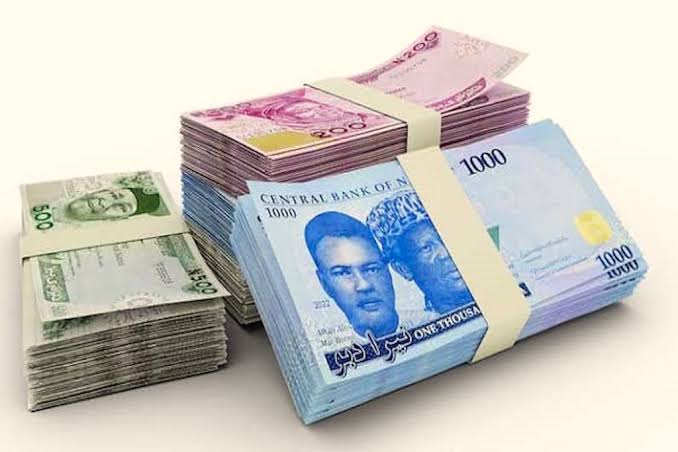Commodification of naira notes
Like all other currencies worldwide, the naira is supposed to serve as a medium of exchange. It is designed to facilitate the sale and purchase of commodities and services. Unfortunately, Nigerians are turning the naira into a commodity, sold and bought like any other commodity. That’s why the currency is vanishing. The CBN hinted about […]

Like all other currencies worldwide, the naira is supposed to serve as a medium of exchange. It is designed to facilitate the sale and purchase of commodities and services. Unfortunately, Nigerians are turning the naira into a commodity, sold and bought like any other commodity. That’s why the currency is vanishing.
The CBN hinted about the possible location of the lost cash, yet that leaves many questions unanswered. “The CBN has noted with dismay the prevalence of illicit flow of mint banknotes to currency hawkers and other unscrupulous economic agents that commodify naira notes, thus impeding efficient and effective cash distribution to banks’ customers and the general public,” the regulator said in a circular addressed to the banks dated December 13, 2024.
Hawking of mint naira notes is not a new phenomenon in Nigeria. It’s a common practice at event centres in the country. This is not a justification for the practice. True, the commoditisation of the naira is a product of one of the bizarre ostentatious behaviours, perhaps unique to Nigerians. We know how to display our wealth and affluence. We flaunt wealth in ways that make others seek to hide their faces in shame.
At events such as wedding ceremonies or house-warming parties, the achievers, including the wedding couple and their parents, are literally “sprayed” with money, in this case, naira currency notes (there have been cases where foreign currency notes were sprayed, also).
Of course, you do not expect the sprayer, clad in his or her flowing native dress such as “agbada”, “Isi-Agu” or any other classy apparel, to spray old, dirty, and smelly naira notes on equally regally dressed celebrants. Not likely! This is the genesis of the trade in naira notes that now threatens the liquidity of the nation’s financial system.
At first, people preparing for big events began by “saving” clean naira notes. This could be done by systematically sieving out such notes and spending just the old ones. It could also be done by exchanging such dirty notes with friends and family, who would readily then give you clean notes, once you told them you had an event to attend soon.
Soon, however, the market for clean naira notes was created. Once there was demand for clean notes, it was a matter of time for the supply lines to manifest. This is how markets are created. All it needed was for providers to create links with the banking system that supplies the notes. And if you look at the hawkers, they look so ordinary that you would know they are just the footmen for some big guys in cozy rooms somewhere.
And naira hawkers know this and they capitalise on demand. When the demand for a product rises, its price is bound to rise. So, the naira hawkers over time have responded to this trend. They are ubiquitous, fleet-footers and business people who know where events are held. They are friends of event centre managers and are allowed free access to such venues.
As you arrive at event centres you are literarily accosted by currency hawkers who approach you for patronage. “Naira notes! Buy naira notes,” they implore you as you arrive at a wedding ceremony, or whatever event a family or group could be hosting. It is an informal discount market, where you receive less than the face value of the currency notes, the difference being the price you pay for the commodity. For instance, on each N1,000, the hawker could say that you would receive N800. The N200 naira is the price you pay for the cash, in this case, a whopping 20 per cent discount or cost to you.
On the part of the hawker, he or she makes a 25 per cent return, for doing practically nothing. So, with this outrageous rate of return, the business is quite lucrative and therefore will be hard to exterminate.
Commodification, the term that the CBN used to describe what is happening to the naira has been part of the march of civilisation, on the positive side of it. In its broadest term, it refers to the mass production of a product, mostly through technological improvements. This makes the product accessible to a wider market at lower prices. Expanding on this further, commodification means removing whatever differentiates a product such that it becomes an over-the-counter or off-the-shelf item that can be bought anyhow.
Differentiated products command higher prices than commodities, by definition. In the news industry, for instance, some media houses command higher prices through product differentiation. This could be achieved through exclusive stories that give an edge to subscribers.
In the case of the naira, its commodification has lowered its status from that of a revered national currency note, to a commodity that can be sold and bought like any other commodity in the marketplace.
From the activities of currency hawkers and their party-going patrons, many Nigerians remember how we commodified the naira during Emefiele’s currency exchange fiasco. Nigerians bought naira with naira. That meant you went home with less naira than you received. So, the naira continues to lose value.
